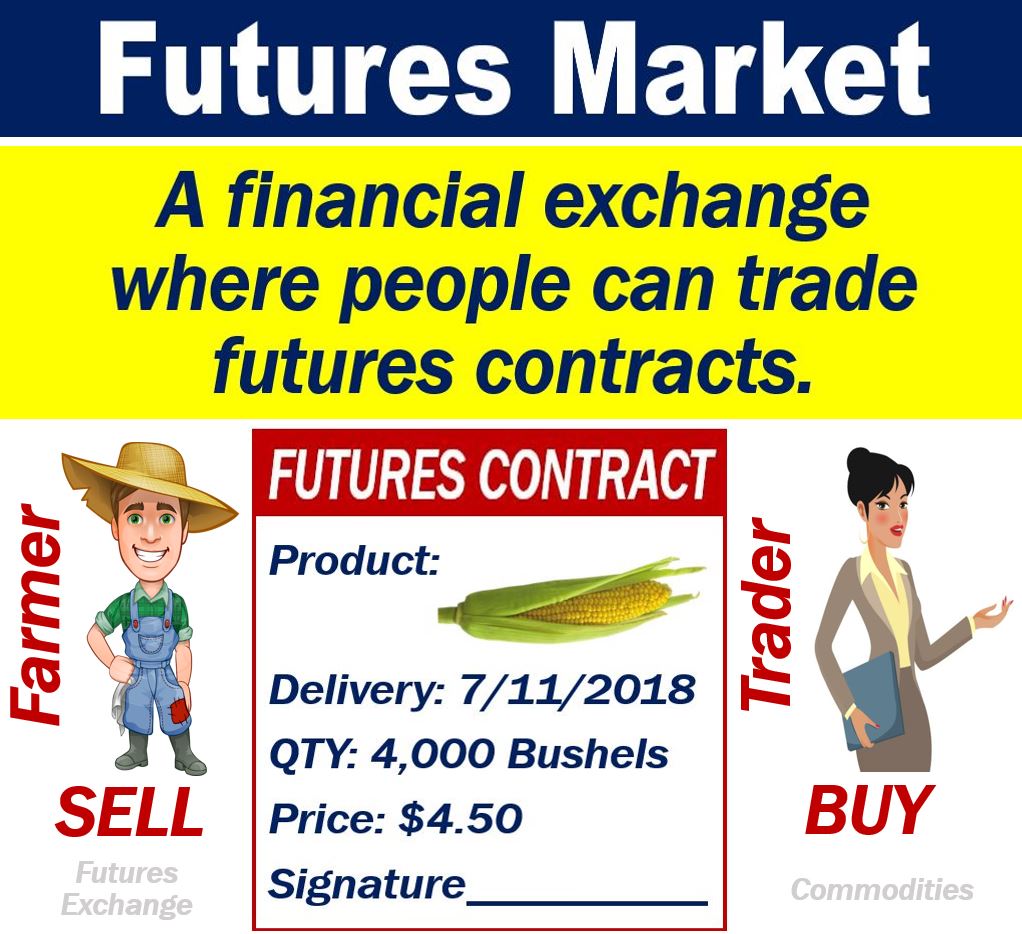A Futures Market is a market in which traders purchase and sell futures contracts. They also buy and sell commodities. The futures contracts are for delivery on a specific future date. Participants trade, i.e., buy and sell their future delivery contracts and commodities in a futures market. The market provides a medium for the complementary activities of speculation and hedging.
We also call it a Futures Exchange.
Global finance
Futures markets play a pivotal role in global finance by allowing investors to gauge and manage the price risks associated with volatile commodities and financial instruments.
A futures contract is a contract to exchange a specific security for a specific price. The price, which is determined on the day of the contract, is created for payment and delivery on a future date.
For people seeking price stability, futures contracts are appealing. In other words, if you are risk-averse, these contracts are great.
BusinessDictionary.com has the following definition of futures market:
“Market in which participants can buy and sell commodities and their future delivery contracts.”
“A futures market provides a medium for the complementary activities of hedging and speculation.”

Futures markets – global presence
There are hundreds of futures markets across the world.
The Chicago Board of Trade, Chicago Mercantile Exchange, and The New York Mercantile Exchange, for example, are futures markets.
The London Metal Exchange, UK Futures Exchange, and The Risk Management Exchange are also futures markets.
Futures Market – digitalized
In the past, futures markets had traders shouting out loud in a trading pit. They also communicated with each other using hand signals.
These face-to-face interactions have all gone. Today, like other markets around the world, futures markets are electronic, i.e., trades occur digitally.
We refer to the old system as ‘open outcry trading‘ and the modern system as ‘electronic trading.’
The Chicago Mercantile Exchange (CME), for example, trades nearly three-quarters of its Futures contracts on its ‘Globex’ trading platform.
More than one million contracts, i.e., over $45.5 billion in trade, go through CME’s Globex trading platform each day.
In a futures market, we call the purchaser and seller of a contract the ‘long’ and the ‘short‘ respectively.
Futures markets are increasingly incorporating sophisticated algorithms and artificial intelligence to facilitate high-frequency trading, allowing for faster and more efficient market transactions.
Futures market regulators
Regulatory agencies across the world monitor the activities within futures exchanges.
In the United States, the regulator is the CFTC. CFTC stands for the Commodity Futures Trading Commission.
The regulator in the United Kingdom is the FCA. FCA stands for Financial Conduct Authority.
Below are the names of regulators in some of the major futures markets:
- Australia: the Australian Securities and Investment Commission (ASIC).
- Chinese mainland: the China Securities Regulatory Commission, i.e., 中国证券监督管理委员会.
- Hong Kong: the Securities and Futures Commission, i.e., 證券及期貨事務監察委員會.
- Japan: the Financial Services Agency, i.e., 金融庁.
- India: the Securities and Exchange Board of India, i.e., भारतीय प्रतिभूति और विनिमय बोर्ड.
- South Korea: the Financial Supervisory Service, i.e., 금융감독원.
“Futures market” terms and concepts
There are many compound phrases in business English related to the “futures market.” Let’s have a look at some of them:
-
Futures Market Analysis
Studying market trends to predict futures movements.
Example: “The broker provided a detailed futures market analysis to help investors make informed decisions.”
-
Futures Market Liquidity
Ease of trading futures without price impact.
Example: “High futures market liquidity ensures that traders can execute large orders without significant price slippage.”
-
Futures Market Volatility
Rate of price change in futures markets.
Example: “Seasoned traders often take advantage of futures market volatility to secure profits.”
-
Futures Market Hedging
Using futures to mitigate price risk.
Example: “Farmers commonly engage in futures market hedging to stabilize their income despite fluctuations in crop prices.”
-
Futures Market Regulations
Rules ensuring fair futures trading.
Example: “Futures market regulations are essential for maintaining investor confidence and orderly trading.”
Video – What is a Futures Market?
This video presentation, from our sister channel on YouTube – Marketing Business Network, explains what the meaning of ‘Futures Market’ is using simple and easy-to-understand language and examples.
